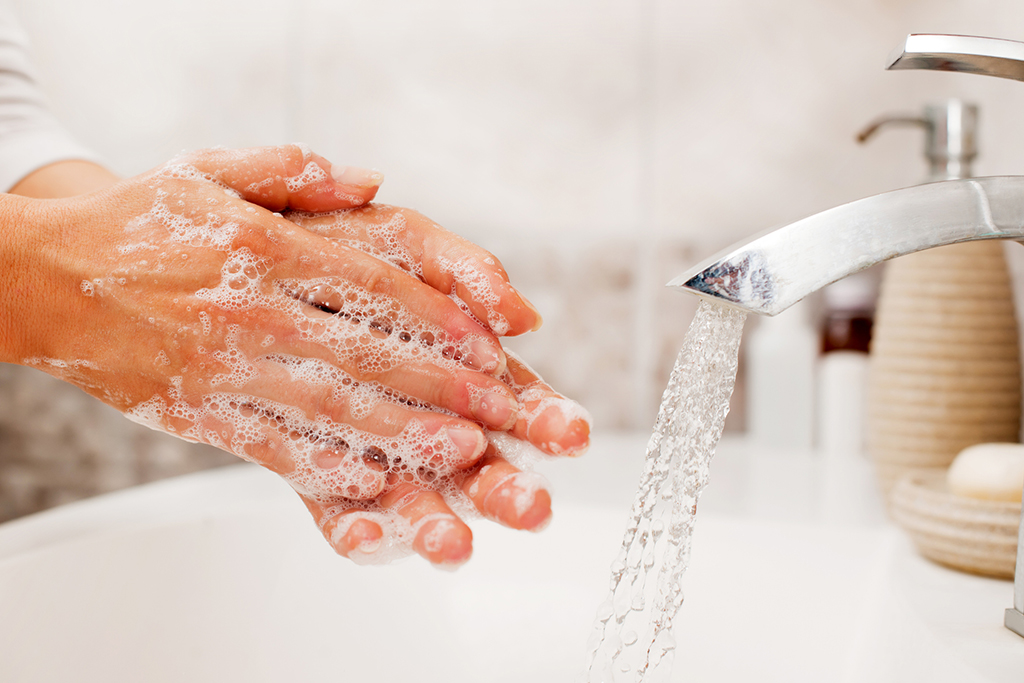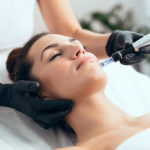
Photo By skynesher at istock
With the globe locked in the COVID-19 pandemic, handwashing has taken center stage like never before. The CDC says that washing the hands is one of the best and most effective means of preventing the spread of germs in your community. Let’s look at the CDC’s recommendations for handwashing and some advice from dermatologists on keeping your hands healthy despite frequent abuse from soap, water, and hand sanitizer.
When to Wash
The CDC says it is important to wash your hands before, during and after making food, prior to eating, and before and after providing care for a sick person. Additionally, take time to wash your hands before and after treating cuts, wounds, and scrapes, after toileting or diapering a baby, and after blowing your nose, sneezing or coughing. And don’t forget to give your hands a good scrub after touching animals or their food or waste.
How to Wash
The CDC outlines the best procedure for washing your hands:
- Wet the hands with clean running water. Turn the tap off. Apply your choice of soap.
- Rub the hands together to lather them; lather the entire hand, including the fingers and under the nails.
- Take at least 20 seconds to scrub your hands. If there’s no timer available, hum “Happy Birthday” in its entirety twice before rinsing your hands with clear running water.
- Air dry your hands or dry them with a clean towel.
If you’re using hand sanitizer instead, make sure it is at least 60% alcohol by content. Apply the product to your hand, and rub your hands, fingers, and nails for a minimum of 20 seconds.
Pitfalls of Frequent Handwashing
Even during normal times, your hands take a beating, according to dermatologists. Factor in the evolving COVID-19 or coronavirus pandemic, and you’ve got a recipe for dry, cracked, raw, and chapped hands due to all of the frequent hand-washing that health authorities recommend to reduce the viral spread and keep you, your families, and Southlake, TX, community safer from this unseen enemy lurking on every surface. Admittedly, dry hands are the least of our collective worries at the moment, but dermatologists warn that it is also important to keep the hands healthy, since chafing and cracking can make your skin more vulnerable to various infection types. It can also lead to the development of conditions like eczema.
The red, itchy, flaky, rash-laden hands that are prevalent in restaurant workers and health care employees are now being seen more and more in the general population as folks scramble to fight off coronavirus germs. Frequent washing of the hands and the application of hand sanitizers along with the use of solutions and wipes used to clean surfaces can really punish your hands. So what can you do to help your hands cope?
Choose a Mild Cleanser
You do not need industrial-strength or even antibacterial soap to clean your hands and remove bacteria and viruses, dermatologists advise. Look for cleansers (even those meant for the body or face) that are free from fragrances and marketed with words such as “sensitive,” “hydrating,” or “gentle.” Alcohol-based hand sanitizers are less irritating to the hands than soap, says dermatologists, and they kill microbes on your skin without removing debris. The CDC warns that hand sanitizers are less effective than soap in cleaning the hands, but professionals say that it makes sense to use them sometimes, such as when you touch a door handle or other possibly contaminated surface.
Avoid Overly Hot Water
Your skin is a delicate organ, and your hands, although designed to withstand a lot, are not impervious to the abuse they go through. While it is almost instinctual to use the hottest water you can stand to try to remove potential pathogens, the CDC says that germ removal is not impacted by water temperature. Because of this, you don’t have to have overly hot water to wash your hands efficiently. Choose water that is at an ideal temperature for your personal tastes, keeping in mind that the hotter the water, the greater the drying impact on your hands.
Moisturize
Choose a fragrance-free lotion or hand cream to keep by your sink, and use it after each and every handwash. It will protect and soothe your skin to defend it against dryness and flaking. Before heading to bed each night, hydrate your hands to the max with our favorite lotion after cleansing them gently one last time for the day. Lotion should be applied while your hands are still moist and warm.
Protect Your Hands
When you’re outside in the cold, protect your hands with gloves or mittens. And don’t forget to wear gloves when you’re washing dishes or cleaning, especially when using cleaners that may irritate your condition further. This will reduce dryness and irritation.
Avoid Scratching
If the skin on your hands is dry, it’s natural to want to scratch it. However, doing so can make things worse. Dermatologists recommend over-the-counter hydrocortisone cream for those times when itching is bothersome. You can also go for an anti-itch relief lotion or a moisturizer that cools while it hydrates.
When To Call Your Dermatologist
If you find yourself unable to heal your dry or cracked hands at home, you may need to be seen by your Southlake, TX, dermatologist Compassion Dermatology. There are several medicinal creams and ointments available to make your hands feel better, including topical steroid creams such as betamethasone or clobetasol. There are also nonsteroidal options, including creams like Elidel and ointments containing crisaborole. Your dermatologist can also evaluate your hands to determine if frequent hand washing is truly the culprit of your dry, chapped hands. Eczema, nerve injuries, underlying health problems, and reactions to medications may also be to blame.


